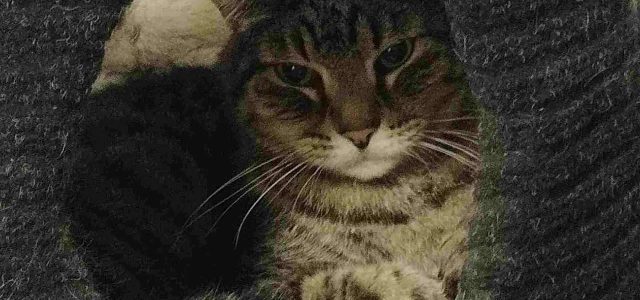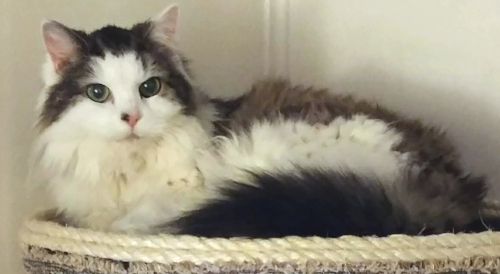We’ve made it no secret here that we advocate for senior animals as much as we can here. It certainly is the premise behind our mantra “Senior pets still have love to give”. More on our own senior pet’s journey HERE. Senior animals should be first on the list for adoption and fostering in our opinion.
I’m sure everyone knows the narrative that says younger animals have more time to find a home. However; we believe there’s another side to this narrative. Older animals need care in the last years of their life. Many times they’ve already given love their entire life and then on the last half of their life… they’re all of a sudden needing a home or a companion.
What makes a cat a “Senior” cat?
 That’s a good question, as not only are cats living longer thanks to veterinary advances and care, but cats do vary. One cat can be energetic and frisky at 12 years while others can need care at 9. The general rule of thumb seems to come in at about 11 years old as the line to call a cat “senior”. From our own experience that’s about right.
That’s a good question, as not only are cats living longer thanks to veterinary advances and care, but cats do vary. One cat can be energetic and frisky at 12 years while others can need care at 9. The general rule of thumb seems to come in at about 11 years old as the line to call a cat “senior”. From our own experience that’s about right.
Check out our Senior Cat Age Calculator to check if your cat is a senior.
While we’ve had cats that have lived much longer, we also have had cats that passed closer to the 11-13 range. It all depends on the cat. Each cat has it’s own issues and good care with proper nutrition makes a difference.
As cats get older you can expect changes much in the same way you can in humans. Your pet will slow down. She doesn’t initiate play the way she used to. Maybe she’s no longer climbing to the top hut on the cat tree. Cats are subject to the same aging conditions that humans are.
Signs your cat might be approaching their senior years
As your cat gets older they’re eventually going to show signs of age. You should know how and why these changes happen. Arthritis, kidney disease, thyroid issues, diabetes, weight loss or gain may rear their head in their aging years.
- Know how to recognize these changes. Studying your pets routine and behavior gives the best look into what’s happening in their world. If something changes you should double check what’s going on there.
- They’re going to sleep more or become less playful as they age. They may be slower to respond to your voice or slower to greet you when you’ve come home. Some cats might seem confused at times when faced with their normal routine. Our experience has been that cats get more vocal as they get older and you can expect them to groom less too. Their fur may get matted more.
- “Accidents” around the house may start becoming more prevalent. While there may be an underlying issue for repeatedly having accidents… it’s important to realize that occasional urinary spills do happen and should be expected. In fact with our own cats, the cat is usually visually upset because it knows it did wrong. This may contribute to the confusion issue mentioned above with regards to why the spill happened in the first place.
- Trouble climbing their favorite cat tree or going in and out of the litter box may become issues. You may need to accommodate their environment to their condition. Arthritis and muscle deterioration happen in cats just like humans.
- You may have noticed they’ve put on some weight or lost some weight gradually over time. Gradually is the key here. Gradually may be just diet. However; if they’ve lost or gained weight in a relatively short period of time, there may be an underlying thyroid issue there or worse. In this case your feline should be scheduled for the vet.
- Many Times your cat will have their own little cubby hole, bed or cat tree hut they retreat to be alone. As they age these spaces will be more frequented. Make sure you know or discover where your cat retreats to when they want to be alone. Sometimes a cat will get sick and retreat there to by itself hiding it’s problems from you.
Care for your senior cat
There are several things you can do to ease your cats progress into their senior years. With a little care and compassion your cat should live a longer life and you both will be happier because of it.
- Bringing your cat to the veterinarian twice a year can help you keep ahead of issues if they arise and it’s good to get a second pair of eyes from a professional to spot things you may have not. Expect tabby to start losing teeth as she gets older and dental issues are something your veterinarian can help you with as well.
- Good nutrition is essential. If your cat hasn’t had any issues and is eating normally then a good nutritious diet will keep them active and healthy. Our recommendation is wet food over dry if you can swing it. If your cat has had issues like bladder stones (crystals), then you need to maintain their diet based on the type of stones they had. If you’re aware of the problem and your feline is still alive then you would have already had this conversation with your veterinarian. Know how much your cat is eating. This is another benefit to wet cat food feeding times. It’s easier to monitor how much you give the cat from the can at a certain time compared to leaving a full bowl of dry food all day.
- Interaction and keeping your cat engaged is essential to their well being. A playful cat will be mentally fit as well as physically fit. Find out what your cat may be more interested in playing with and engage with them. Some like toy mice while others prefer padded socks. What your particular cat is interested in will vary. We had a cat that would only engage with shoe laces and we have had cats that engaged with anything. Find out what your cat likes. When in doubt, default to a cat laser light.
- Grooming your cat (and that would include trimming your cats claws) can be a good way to interact with your feline. We’ve had cats that were favorable and not so favorable to this. If their fur is starting to get matted… force the issue. If their claws aren’t maintained you can expect other issues to arise such as the gate when they walk/run/jump will change or they will get sore feet pads.
- Change their environment to accommodate their issues. If they’re arthritic, making things easier to climb or having another litter box (at least one per floor) would ease their needed movement. A blanket in their favorite cubby hole would be grand. Something to curl up in and keep warm. While we’re on the subject, dogs aren’t the only ones that can wear jackets for warmth. Extra padding on chairs and ramps to their favorite nesting area will work too.
- Learn your cat’s routine. Cat’s will generally adhere to a routine throughout the day. Take notice and make yourself aware of changes in both behavior and routine so you can notice issues if they arise.
- When scooping the litter box take notice of your cat’s stool and urine. This may be an indicator of something going on. Maybe a change in diet is warranted. Constipation and diarrhea would be noticed here and maybe flags to other issues.
Super Seniors, approaching a cat’s golden years
 This will vary in cats as well. Obviously, the more serious the issues a cat has, the closer to their golden years they are. Generally speaking, if you’re cat is over 15 years old then you’ve got a super senior in our opinion.
This will vary in cats as well. Obviously, the more serious the issues a cat has, the closer to their golden years they are. Generally speaking, if you’re cat is over 15 years old then you’ve got a super senior in our opinion.
The obvious thing is that the issues listed above are more accentuated or may rear their head as your cat gets even older. Consider more padding for areas they lay in and a night light are a good help for cats that develop vision problems.
Dental problems can get more prevalent and can be a hindrance to eating if their teeth cause them pain. Home brushing with your cat can go either way. Our practical knowledge on the issue is they either like it or they don’t… they either like the flavor of the cat toothpaste or they don’t. It wouldn’t hurt to try and get them into a dental routine rather than dragging them to the vet when an issue arises.
Activity is crucial to keeping your cat healthy. Keeping her active will keep both her body and mind engaged and will promote a longer healthier life.




